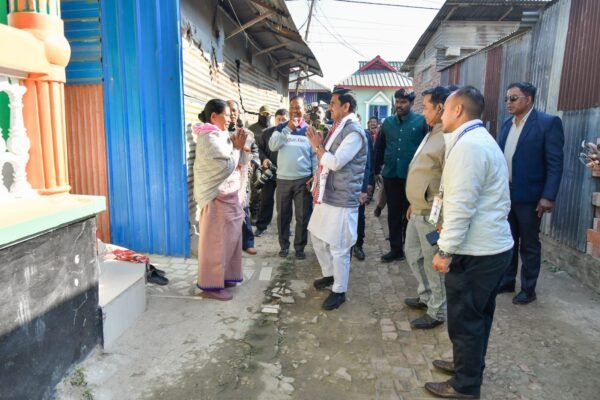*Meghalaya partners with NITI Aayog to develop sustainable hill cities*
Shillong, Nov 4: NITI Aayog, in collaboration with the Government of Meghalaya, organized a one-day workshop on the Hill Regions Planning Initiative (HRPI) at the Courtyard by Marriott, Shillong. The workshop focused on developing a roadmap for “Sustainable, Climate-Resilient, and Economically Vibrant Hill Cities” and brought together senior government officials, policymakers, and experts to deliberate on sustainable urban development in hill regions.
Arts and Culture Minister Sanbor Shullai attended the event as the Chief Guest and delivered the keynote address. He highlighted that hill cities, though rich in natural and cultural resources, face unique challenges related to terrain, infrastructure, and climate vulnerability. He described the initiative as a step towards sustainable and inclusive growth under the vision of Prime Minister Narendra Modi and emphasized the need to balance economic growth with environmental protection. Shullai added that the focus should be on promoting eco-tourism, local entrepreneurship, and youth empowerment, ensuring that hill regions contribute to Viksit Bharat @ 2047.
Urban Affairs Commissioner and Secretary Vijay Kumar D. welcomed the participants and termed the initiative “timely and apt.” He outlined Meghalaya’s goal to become one of the top ten developed states in India by 2032 and said that the ten-year development plan, initiated in 2022, focuses on improving GDP, achieving Sustainable Development Goals (SDGs), and enhancing ease of living.
NITI Aayog’s Principal Economic Adviser and Programme Director Anna Roy explained that the initiative is part of NITI Aayog’s “State Support Mission,” designed to create a specialized framework for hill cities. She noted that while urban models for plains already exist, hill regions require a distinct and “bespoke approach” due to their geographical and climatic conditions. She added that the workshop’s discussions would contribute to a comprehensive study, jointly developed by NITI Aayog and the hill states, to ensure actionable and sustainable outcomes.
Representing the Northeastern Council (NEC), Planning Adviser Som Kamei said that urbanization plays a vital role in economic growth. He pointed out that hill cities face specific challenges in managing population growth and assured that the NEC would integrate the workshop’s findings into Vision 2047 while working with stakeholders to promote a balanced and sustainable development model.
During the technical sessions, experts including Jagan Shah, CEO of The Infravision, presented global best practices for hill cities and discussed key issues related to infrastructure, mobility, and sustainable land use. Dr. Uday Bhonde from NIUA shared examples of climate action projects, while Snehit Prakash, Regional Director of Borda Asia, spoke on climate-resilient planning and stakeholder collaboration.
Further presentations included insights from IIT Guwahati’s Prof. Arup Sarma, who discussed carrying capacity assessment and sustainable accommodation frameworks, and IIT Roorkee’s Prof. Mahua Mukherjee, who emphasized resilience and participatory planning. Former Shimla Deputy Mayor Tikender Singh Panwar discussed governance, policy, and financing frameworks suited to hill regions and advocated for a “terraced governance model” to ensure ecological and inclusive development.
The workshop concluded with an interactive round-table discussion that identified priority research topics, pilot cities, and potential knowledge partners to advance the initiative.
The event reaffirmed Meghalaya’s commitment to Vision 2047 and emphasized the need for innovative policies, financing reforms, and planning strategies to build sustainable, inclusive, and climate-resilient hill cities.









